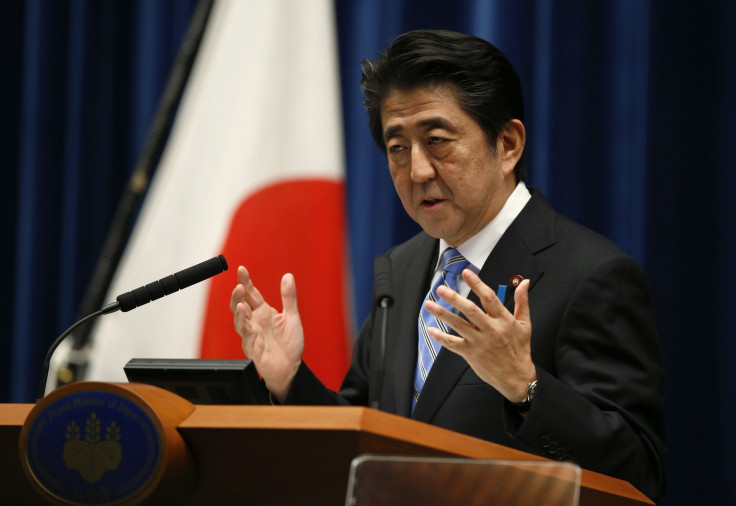Japan Recession 2014: Prime Minister Calls Snap Elections, Will Resign If His Party Doesn't Win Majority In Parliament

Japanese Prime Minister Shinzo Abe announced Tuesday he would dissolve the lower house of Parliament and call snap elections as a mandate on his trademark economic policy after news that Japan slid into a recession. He said he willresign if his Liberal Democratic Party did not win a majority.
Japan’s economy shrank 1.6 percent in the third quarter, according to a preliminary government report released Monday. It followed a 7.1 percent annualized contraction in the Q2 2014, making for Japan’s fourth technical recession since 2008. A recession is generally defined as two consecutive quarters of contraction.
Abe announced the parliamentary dissolution and Japan’s next few steps at a televised news conference on Tuesday. Abe and his government raised sales taxes from five to eight percent in April, which likely contributed to the negative growth. A planned tax hike from eight to 10 percent scheduled for October 2015 would be delayed 18 months, but would not be delayed a second time, he said.
He was defensive of his “Abenomics” economic policy, which he promised Japanese voters in 2012 would bring Japan out of its 20 year deflationary trend.
“I am aware that critics say ‘Abenomics’ is a failure and not working but I have not heard one concrete idea what to do instead,” he said, according to Reuters. “Are our economic policies mistaken, or correct? Is there another option? This is the only way to end deflation and revive the economy.”
Abe became prime minister for the second time in 2012 running on the idea that Abenomics would dig the world’s third largest economy out of its rut. Boiled down, Abenomics involves injecting money into the economy the reflate it, spending government funds to stimulate the economy and undertaking business and investment-friendly policy.
Critics say Abenomics has only benefitted big business and the relatively wealthy, who can weather inflation better than Japan’s working class, who haven’t seen their wages rise in conjunction with the devalued yen.
The parliamentary elections must be held within 40 days and are expected on Dec. 14. The next scheduled election was for late 2016. Abe and those near him have been mulling over when to call early elections for months, according to Reuters. Abe is reportedly hoping to avoid losing popular support for his Liberal Democratic Party by taking the initiative in calling for elections, as opposed to hesitating and bowing under political pressure, which could sway favor away from his party. The LDP has two thirds majority in the lower house of Japan's bicameral National Diet legislature.
© Copyright IBTimes 2025. All rights reserved.





















